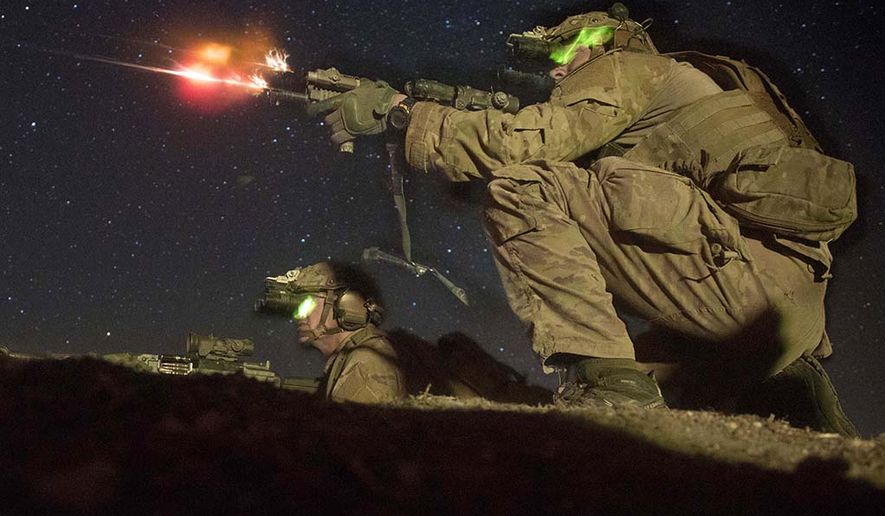The COVID-19 pandemic has upended U.S. military operations around the world, stalled some training at home and troop movements abroad, and halted a host of exercises with key allies from Asia to Europe.
But one major American military operation has forged ahead with seemingly little impact from COVID-19: counterterrorism operations in Somalia, which have hit record levels over the past two months. Pentagon officials are racing to keep pressure on the al-Shabab terrorist network and are not allowing a global outbreak to offer even a small reprieve for U.S. enemies.
So far this year, American forces have conducted at least 39 airstrikes against terrorist targets in Somalia. That figure has the U.S. on pace to set a record again this year in its war against terrorists in Africa.
Last year, the U.S. carried out 63 strikes against al-Shabab and Islamic State targets in Somalia, according to numbers provided by U.S. Africa Command, which oversees military operations on the continent.
The pace of America’s air assault in Somalia is rising for a number of reasons, analysts say. Broadly speaking, the U.S. in recent months has slowly and gradually reduced its direct military engagements in other corners of the continent, including in the Sahel region where French forces are now taking the leading role in counterterrorism operations.
The shift in the U.S. Africa strategy has left Somalia as the focal point and the most appealing theater to target extremists. Many of the recent airstrikes have targeted al-Shabab leadership, underscoring the Trump administration’s effort to weaken the group by taking out its most senior members.
But the COVID-19 pandemic also is likely playing a role. Regional analysts say the outbreak has greatly restricted major ground combat operations against al-Shabab strongholds, leaving Somali government forces and African Union Mission to Somalia (AMISOM) troops unable to mount their own offensives.
“There’s just not a lot of political will to conduct sustained ground operations, especially now,” said Seth Jones, director of the Transnational Threat Project at the Center for Strategic and International Studies. “With COVID-19 and with concerns among AMISOM countries, you don’t even have the ground option as a short-term option. They’re just not going to deploy right now. The strikes — that’s really all you’ve got right now.”
Indeed, coronavirus concerns have temporarily restricted U.S. ground efforts on the continent as well. Over the past two months, AFRICOM has canceled or postponed several major military exercises, underscoring Pentagon leaders’ efforts to enforce social distancing and keep large gatherings of troops to a minimum whenever possible.
Threats across Africa
Military officials say the virus also has presented other threats across Africa. They say terrorist groups — led by the powerful al-Shabab, which controls major swaths of territory across Somalia — could try to take advantage of distractions from undermanned governments while they work to keep their citizens safe during COVID-19 outbreaks.
“While we might like to pause our operations in Somalia because of the coronavirus, the leaders of al Qaeda, al-Shabab and ISIS have announced that they see this crisis as an opportunity to further their terrorist agenda. So we will continue to stand with and support our African partners,” U.S. Army Gen. Stephen Townsend, commander of AFRICOM, said in a statement this month announcing yet another American airstrike against an al-Shabab target.
The U.S. is continuing efforts in Somalia even after top officials at the United Nations called on all countries to temporarily cease military operations to focus on the COVID-19 outbreak.
“There should be only one fight in our world today, our shared battle against COVID-19,” U.N. Secretary-General Antonio Guterres said this month.
But U.S. military officials say suspending the fight simply isn’t an option. Officials say the pandemic has done little to slow al-Shabab’s efforts to capture more territory across Somalia, weaken the already fragile Somali government in Mogadishu and destabilize the region.
In the months to come, analysts say, air power alone likely won’t be enough. African nations could give al-Shabab and other terrorist groups an opportunity by continuing to shy away from major ground combat operations.
“When it comes to taking advantage, longer term, there are potential opportunities to push into areas if AMISOM countries in May and June decide that it’s not worth going out on patrols, intersecting with local populations, if they’re still concerned about pandemics,” Mr. Jones said. “I think it’s more of a midterm concern.”
On the ground in Somalia, U.S. military officials also are grappling with near-constant claims that their airstrikes have killed innocent civilians. These allegations are often made by terrorist groups, though some human rights organizations also have charged that the military has greatly downplayed the number of civilian deaths.
In a comprehensive review of civilian casualty allegations released Monday, AFRICOM confirmed that an airstrike on Feb. 23, 2019, likely killed two civilians and wounded three others. Two al-Shabab terrorists were also killed in the attack, officials said.
“While we follow very precise and rigorous standards, in instances where we fail to meet our expectations, we will admit the mistake,” Gen. Townsend said in a statement accompanying the report.
The U.S. also has admitted that two civilians were killed in an April 2018 airstrike in Somalia.
An Amnesty International report released last year said the U.S. has killed at least 14 civilians in Somalia, but the Pentagon has vehemently denied those numbers.
• Ben Wolfgang can be reached at bwolfgang@washingtontimes.com.




Please read our comment policy before commenting.